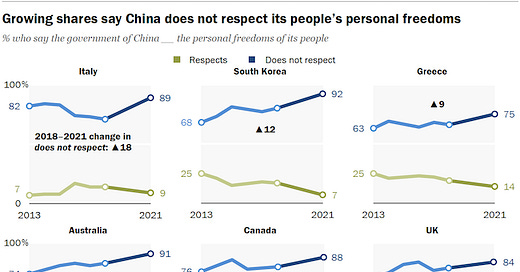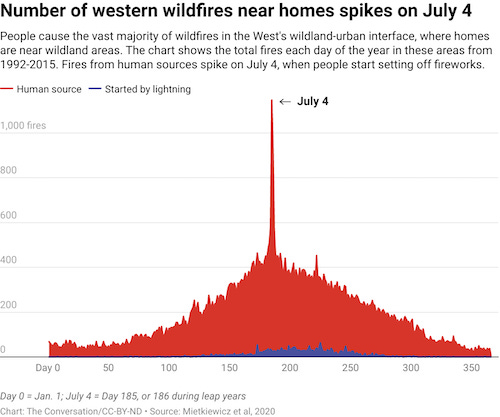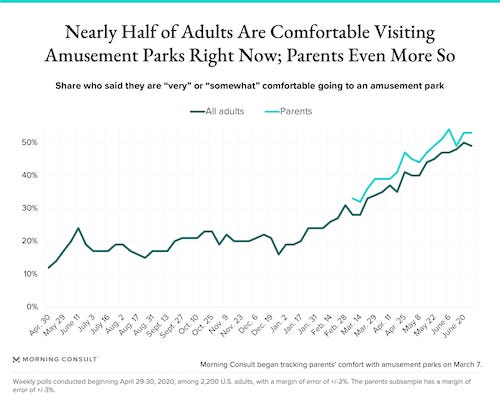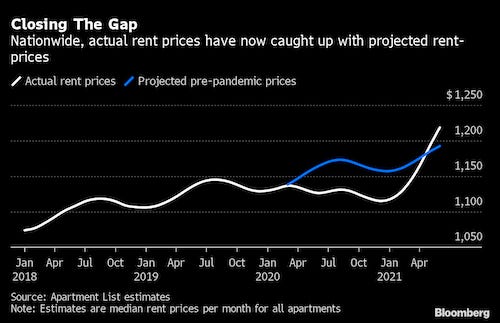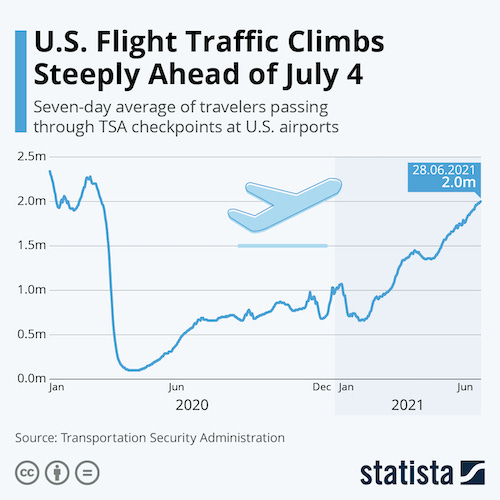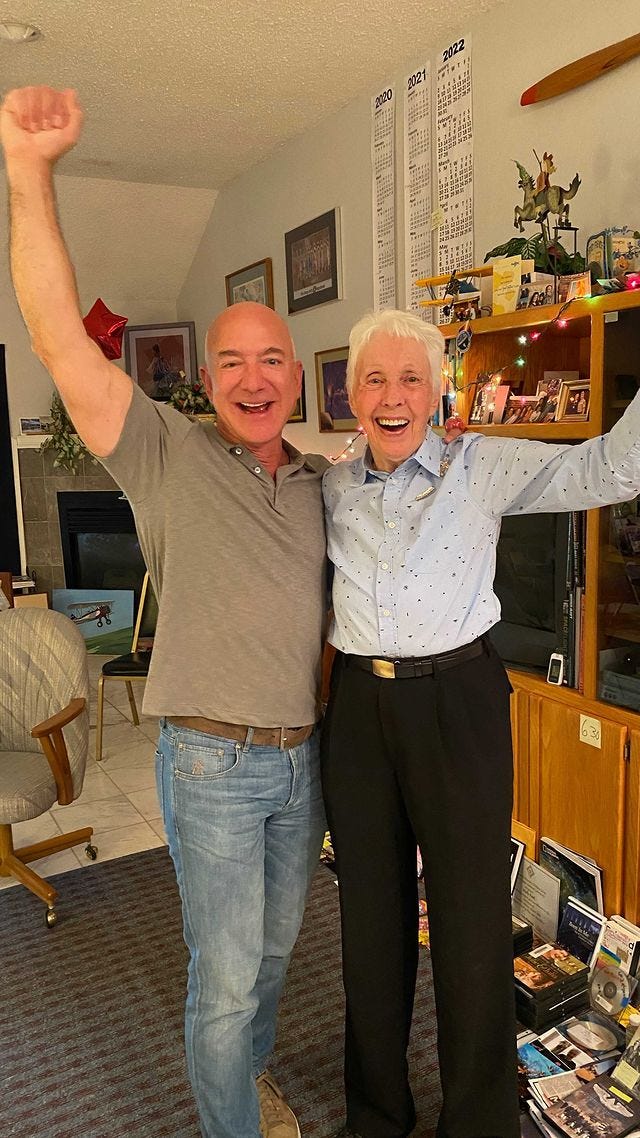Today’s posts that caught my eye:
Democrats in Trump-won districts are hesitant about their party using the reconciliation process to ram through a second, partisan infrastructure package, according to Axios, which “surveyed all seven House Democrats representing districts former President Trump won in 2020 to hear their concerns with the current infrastructure debate.” Perhaps there’s a reason Joe Manchin hasn’t rejected the reconciliation option for Infrastructure II… others might do it for him.
Virgin Galactic announced plans to launch its billionaire founder Richard Branson into space on July 11, Axios reports, adding “the date is nine days before Jeff Bezos, founder of Virgin Galactic competitor Blue Origin, is set to take off for space.” Bragging rights must be very important.
July 4th guest you’d most want to host: Wally Funk.
Subscribers support the creation of the newsletter, podcasts & live events.
The World
The world’s leading economies signed up to a plan to force multinational companies to pay a global minimum corporate tax rate of at least 15% following intense negotiations in Paris at the OECD. The historic agreement among 130 countries will ensure the largest companies pay at least $100bn a year more in taxes, with more of that money going to the countries where they do most of their business. The rules should be put in place next year and implemented in 2023. Only nine of the 139 countries involved in the talks refused to sign up, including Ireland, Estonia and Hungary. (Financial Times)
The Supreme Court gave states new latitude to impose restrictions on voting, using a ruling in a case from Arizona to signal that challenges to laws being passed by Republican legislatures that make it harder for minority groups to vote would face a hostile reception from a majority of the justices. The vote was 6 to 3, with the court’s three liberal members in dissent. The decision was among the most consequential in decades on voting rights, and it was the first time the court had considered how a crucial part of the Voting Rights Act of 1965 applies to restrictions that have a particular impact on people of color. (New York Times)
European Commission President Ursula von der Leyen criticized Slovenia’s government for its approach to media freedom and the judiciary, marking a turbulent start to the country’s EU presidency. In a press event that ushered in Slovenia’s six-month term steering the EU, von der Leyen underlined the need for a free and independent media as “the essence of democracy” and called for prime minister Janez Jansa to unblock funding for a publicly owned press agency. In a testy exchange, she urged Jansa to name his country’s representatives to the new European Public Prosecutors Office with the “utmost urgency”, and insisted that judges were entitled to their personal political views. (Financial Times)
The German interior minister called UEFA’s decision to hold the Euro 2020 semi-finals and finals in the UK “absolutely irresponsible”, at a time when the country is battling the highly infectious Delta coronavirus variant. “I suspect that once again it’s all about commercial [interests],” Horst Seehofer said. “But commercial interests should not override the need to protect people from infections.” (Financial Times)
After nearly 20 years the U.S. military left Bagram Airfield, the epicenter of its war to oust the Taliban and hunt down the al Qaida perpetrators of the 9/11 terrorist attacks on America. The airfield was handed over to the Afghan National Security and Defense Force in its entirety. (Associated Press)
President Vladimir Putin has signed a law that obliges foreign social media giants to open offices in Russia, the latest move by Moscow to exert greater control over Big Tech. The Russian authorities are keen to strengthen their control of the internet and to reduce their dependence on foreign companies and countries. (Reuters)
Large majorities say China does not respect the personal freedoms of its people. Unfavorable views of China also hover near historic highs in most of the 17 advanced economies surveyed. (Pew Research Center)
About 1,000 counties in the U.S. have vaccination coverage of less than 30%, the director of the CDC said. The counties in question are mostly located in the Southeast and Midwest and are most vulnerable to Covid infection. (CNBC)
House Speaker Nancy Pelosi announced that Rep. Liz Cheney, an outspoken critic of former president Donald Trump, will serve on a select committee investigating the Jan. 6 attack on the U.S. Capitol by a pro-Trump mob. Pelosi (D-Calif.) also tapped Rep. Bennie G. Thompson (D-Miss.) to chair the 13-member panel and announced her other appointments. House Minority Leader Kevin McCarthy (R-Calif.), who opposed the committee, has repeatedly declined to say whether he plans to appoint members; at a news conference Thursday morning, he dodged questions on the subject. (Washington Post)
Democrats in Trump-won districts are hesitant about their party using the reconciliation process to ram through a second, partisan infrastructure package, even as the more progressive wing of their party demands it. Axios surveyed all seven House Democrats representing districts former President Trump won in 2020 to hear their concerns with the current infrastructure debate. Nearly all are undecided about how they'll vote on either the $1.2 trillion bipartisan bill or a partisan follow-up. (Axios)
The recall election for CA Gov. Gavin Newsom is set for Sept. 14. The timetable gives prospective candidates just over two weeks to decide whether to jump into an expected frenzied race to replace the governor. (Los Angeles Times)
‘Our poor little town of Lytton is gone’: Until this week, “Canada’s hot spot” might have seemed like a charming nickname for Lytton, B.C., a tiny town where summer temperatures soar. But after a week of tragedy, the tagline has an ominous edge. Lytton broke successive Canadian heat records early this week, with temperatures peaking at 121 degrees on Tuesday afternoon. Then the fires swept in. By 6 p.m. Wednesday, Lytton’s 250-odd residents had been ordered to evacuate by the town’s mayor as explosive wildfires neared. (Washington Post)


Humans start the most wildfires on July Fourth: For decades, one of the most striking and predictable patterns of human behavior in the western U.S. has been people accidentally starting fires on the Fourth of July. From 1992 to 2015, more than 7,000 wildfires started in the U.S. on July 4 – the most wildfires ignited on any day during the year. And most of these are near homes. (The Conversation)
Economy
Car sales rebounded in a big way during 2Q21, but they could have been stronger if production kept up with demand, according to new data. The global chip shortage continued to plague automakers, limiting the number of cars available for sale and in turn driving up prices. Edmunds analysts forecast a total of nearly 4.5 million new cars and trucks were sold in the second quarter, up 52% from last year. (Axios)
Apple is reportedly working on a program called “Retail Flex,” which will give its store employees the chance to work from home some weeks. The employees would be remotely handling things like tech support and online sales part of the time, and working at the store as usual at other times. (The Verge)
As consumers feel comfortable again, amusement parks could be in line for a busy summer. 49% of U.S. adults said they feel comfortable visiting an amusement park, while one-third said they’d feel comfortable heading to one in the next month. Millennials (55%) and members of Generation Z (58%) are most excited to return to amusement parks. (Morning Consult)
A tale of two rents: During the pandemic, rents in many big cities plunged. More than a year after cities went into lockdown, rents in the most expensive housing markets are rising, but they haven’t caught up to pre-pandemic projected prices — or what they would have been if the pandemic hadn’t happened. June 2021 rents in San Francisco are 16.2% lower than their pre-pandemic projections, for example. Nationwide, the story is different. The gap between actual and projected prices closed for the first time in May, and in most U.S. cities researchers looked at, rent prices are now similar to their pre-Covid estimates. (City Lab)
Technology
Federal Trade Commission expands its antitrust powers in Chair Lina Khan’s first open proceeding — The first open business meeting of the F.T.C. in more than 20 years. (The Verge)
Sen. Elizabeth Warren is calling on a federal watchdog to investigate Google for alleged abusive behavior in advertising, potentially adding to the tech giant’s regulatory woes. The Massachusetts Democrat, however, isn’t turning to the Justice Department, which already brought a historic antitrust case against the search giant. She wants the Commodity Futures Trading Commission to take on the case, arguing that the largely unregulated world of online advertising could fall under the jurisdiction of the country’s top derivative markets cop. (Washington Post)
Amazon sets a new tone as Jeff Bezos era comes to an end: Amazon added two new entries to its set of 14 leadership principles, including “Strive to be Earth’s Best Employer” and “Success and Scale Bring Broad Responsibility.” The additions reflect the challenges that lie ahead as CEO Jeff Bezos prepares to step down from his role on July 5. (CNBC)
Amazon is discussing forming a “Rebel Alliance” with Slack and other companies to challenge Microsoft's dominance of the work-productivity app market. (Insider)
Virgin Galactic announced plans to launch its billionaire founder Richard Branson into space on July 11. The date is nine days before Jeff Bezos, founder of Virgin Galactic competitor Blue Origin, is set to take off for space. Branson will journey to space in Virgin Galactic's VSS Unity spacecraft along with two pilots and three other mission specialists as part of the company's fourth crewed mission. (Axios)
Instagram is no longer a photo sharing app, according to Adam Mosseri, the head of Instagram. In a video posted to his Instagram and Twitter accounts, Mosseri said the company is looking to lean into entertainment and video after seeing the success of competitors like TikTok and YouTube. He describes some upcoming changes and experiments that Instagram will be doing, including showing users recommendations for topics they’re not following and making video more immersive by offering a full-screen experience. (The Verge)


Smart Links
Robinhood targets valuation of at least $40bn in IPO. (Financial Times)
Gold suffers worst month since 2016. (Financial Times)
CRISPR milestone pushes gene editing toward its promise. (Axios)
Remote working has a sexual harassment problem. (Wired UK)
Justice Department orders halt to federal executions. (Wall Street Journal)
Australia’s luxury-home sales soared 58% annually in 1Q21. (Mansion Global)
Germany to have 1 million electric cars on the road in July. (Reuters)
U.S. News hospital rankings to include new categories, examine equity. (Healthcare Dive)
Ancient beetle is the first new species discovered in fossilized poop. (Science)
U.S. flight traffic climbs steeply ahead of July 4. (Statista)
Good News
‘No one has waited longer’: Wally Funk, a trailblazing female pilot denied the job of astronaut in the 1960s over her gender, will finally get the chance to fulfill her dreams of going into space. Billionaire and Amazon founder Jeff Bezos announced that Funk will be part of a four-person crew set to be launched into space by Blue Origin during a 10-minute flight on his rocket New Shepard later this month. Funk, 82, will be the oldest person ever to travel into space. (The Guardian, Video of Wally & Jeff)
Cook’s family recipe lifts hospital employees’ spirits during COVID. In the early days of COVID-19, Stanford Hospital cook Hilda Fabian could look in her customers' eyes and tell that the health crisis was taking a toll. (Stanford Medicine)
Subscribers support the creation of the newsletter, podcasts & live events. See you Sunday!

